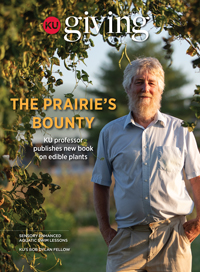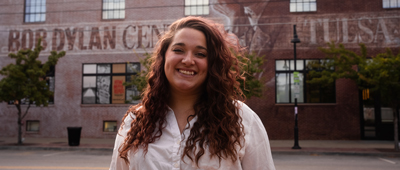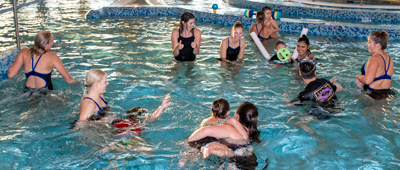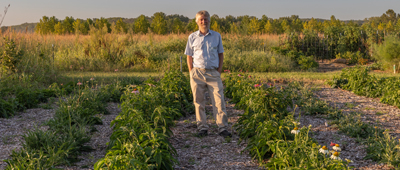KU Giving Magazine
Campus Happenings — Fall 2020
KU Endowment Staff
KU Endowment board members elect new trustees
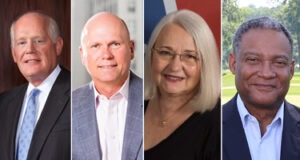
The KU Endowment Board of Trustees elected four alumni as leaders at their annual meeting in October. Paul E. DeBruce, Gerry Dixon, Dana Valdois Hensley and Dave B. Roland were welcomed as new trustees. DeBruce graduated from KU in 1973 with a bachelor’s in business administration. He is CEO of DeBruce Companies and the DeBruce Foundation. Dixon earned his bachelor’s in accounting and business administration in 1990 and is managing partner, U.S.-East markets at Ernst & Young LLP based in New York City. Hensley received a bachelor’s in language arts in 1973 and a master’s in educational curriculum and instruction in 1976. She is a retired principal at Wichita Collegiate School. Roland graduated from KU in 1980 with a bachelor’s in electrical engineering and recently completed a business leadership role as president and CEO of NDC Technologies in Dayton, Ohio.
Distinguished Professor receives Chancellors Club Teaching Award
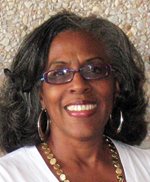
Maryemma Graham, a distinguished professor and Black writing, literary and cultural studies scholar in the Department of English, was named the 2020 Chancellors Club Teaching Award Recipient. Graham is the founder, director and a financial supporter of the Project on the History of Black Writing (HBW), which began in 1983. HBW has been a leading force in research and inclusion efforts in higher education. It has created the largest digital archive of African American fiction in existence. Graham attributes this award to her late aunt and mother, who were devoted teachers during hostile and violent school environments following desegregation. “I am grateful that KU has allowed me to extend the vision of generations of Black educators whose lead I follow,” she said.
No. 1, 19 times
Kansas Public Radio earned the Station of the Year award for a record 19th time from the Kansas Association of Broadcasters.
New online program
KU’s new online undergraduate certificate in public and population health focuses on key concepts and understanding the connection between public health and the community. The program is a collaboration between the KU Edwards Campus and KU Medical Center.
Rural health program support
Inspired by their experiences with rural medicine and its importance, Harold and Fern Ehrlich made a $2 million gift commitment to benefit the Summer Training Option in Rural Medicine (STORM) program at KU School of Medicine. STORM places students in rural sites across Kansas for seven weeks of clinical training and research. The gift will provide stipends to program participants. The Ehrlichs hope the experience will lead to more students choosing rural primary care medicine after graduation. “If I had a billion dollars, anyone living in rural areas would have readily available, prompt and affordable medical services,” Harold said.
Supporting health care heroes
The KU School of Law’s Medical-Legal Partnership (MLP) offered a pop-up clinic this spring to provide free legal services to front-line health care teams working to keep our communities healthy. Through the Advance Care Planning Clinic, KU MLP licensed attorneys, law students and pro bono private bar attorneys helped participants complete a variety of legal documents. The services were available to essential workers.
Helping in a time of need
In late spring, it was difficult to predict how COVID-19 would impact hospitals and provider resources across Kansas. To plan for anticipated needs in rural areas — Kansas has 34 counties with just one or two doctors — the Kansas Pandemic Volunteer Health Care Workforce was created. Funded by a gift from the Patterson Family Foundation in Kansas City, Mo., the volunteer program made it possible for fourth-year medical students to graduate early and work with doctors and nurses in Kansas hospitals.
“We are dedicated to improving health in our communities and saw an opportunity to step in and help during a time of need,” said Lindsey Patterson Smith, director of the Patterson Family Foundation. Although the need for assistance was not as great as initially expected, eight early graduates volunteered in Liberal, Dodge City and Pittsburg hospitals during a time of peak capacity. An additional 14 graduates helped with contact tracing. Volunteers received a stipend and were reimbursed for meals and lodging.
Commemorating 100 years of women’s suffrage
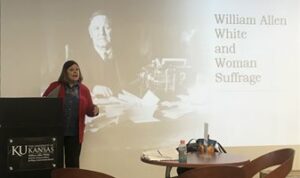
Throughout the 2019-2020 school year, the William Allen White School of Journalism and Mass Communications celebrated the 100th anniversary of the 19th Amendment by hosting suffrage events. Ratified in 1920, the 19th Amendment affirmed the citizenship of more than 26 million women and granted them the right to vote. The Centennial Celebration events were organized by Associate Professor Teri Finneman and included an undergraduate essay contest honoring women’s suffrage, a play hosted by the University Theatre and a series of presentations. The discussions focused on the importance of voting, the history of the movement and how the struggle persists.
Scholarship honors women in journalism
Talented journalism students from Kansas have a new scholarship opportunity thanks to Loretta Pendergraft. A 1940 KU graduate, Pendergraft was one of the first Jayhawk Journalists. She created the Loretta Diggs Pendergraft and Keith Pendergraft Journalism Scholarship to honor the work of women in journalism. An associate editor for the University Daily Kansan while earning her degree, Pendergraft recently celebrated her 102nd birthday in Wichita, Kan. Inaugural scholarship recipient Alicia Getty said, “This scholarship has allowed me to devote more time to areas I am passionate about, and I send my deepest gratitude to the Pendergraft family.”
Back to campus
The University of Kansas was the first community to participate in a pilot project to test a health verification mobile app called CVKey. Created by CVKey Project, a nonprofit initiative co-founded by Brian McClendon, the app was created to help responsibly reopen society. McClendon is a KU alumnus and research professor in KU’s School of Engineering. Participants use the app to conduct a self-assessment of their COVID-19 health status and generate a QR code to access campus buildings. Individuals will not have to disclose detailed personal health information, and data is not shared outside the user’s mobile device.

KU School of Medicine’s new dimension
A generous gift from Mark and Heather Staudacher’s Elliott Family Foundation will provide virtual reality equipment to all three KU School of Medicine campuses. The $100,000 gift supports the purchase of headsets, software and other tools to teach anatomy and point-of-care ultrasound (POCUS) using 3-D simulation. Medical students learn POCUS and its interactions with anatomy and pathophysiology about 40% faster than with traditional methods. Heather Staudacher says the gift honors her late father, David Elliott, who battled kidney disease and cancer, while also helping the university close to her family’s heart.
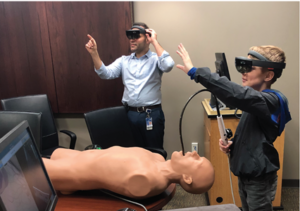
Portable tent protects health care professionals
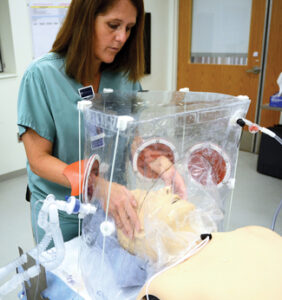
A team of anesthesiologists at KU Medical Center and The University of Kansas Health System created a prototype barrier to minimize the risk of exposure to COVID-19 and other aerosolized pathogens from infected patients. The Contagion Solutions Tent is portable, affordable and disposable. The clear tent is designed to create a sealed negative pressure environment around a patient’s head with access areas for health care professionals to provide treatment safely.
An anesthesiology research fund created by Gail and Karl Becker of Leawood, Kan., helped make this innovative project possible. Dr. Karl Becker said, “To be one of the top medical centers in the country, KU Medical Center must be recognized for its clinical and basic research. We trust the Gail and Karl Becker Fund for Basic Research in Anesthesia’s partial funding of the Contagion Tent will assist in this endeavor.”
The tent is awaiting FDA approval. The goal is for it to be a long-lasting solution to help people around the world.
You said it
“Research shows that students often drop out because they are lacking a few hundred dollars, so I want to support undergraduate funds in case of an emergency.”
Ada Emmett | Lawrence, Kan.
“I lived in Battenfeld Scholarship Hall for three years, and I loved it so much! I hope someone can benefit from that hall just as much as I did.”
Schol hall resident anthony howcroft, bachelor’s in chemistry 2016, and spouse Sydney Nelson Howcroft, bachelor’s in accounting and data analytics 2018, master’s in accounting 2019 | Philadelphia, Pa.
“I am giving to the Mark Hirschey Scholarship in the School of Business because professor Hirschey changed my life, and I want to give annually in his memory.”
Brian Lall, bachelor’s in business 2006 | Blue Bell, Pa.
“As a proud alumna, I want to support KU and help others in getting an exceptional education.”
Debbie Lee, bachelor’s in medical technology 1981 | Union City, Calif.
